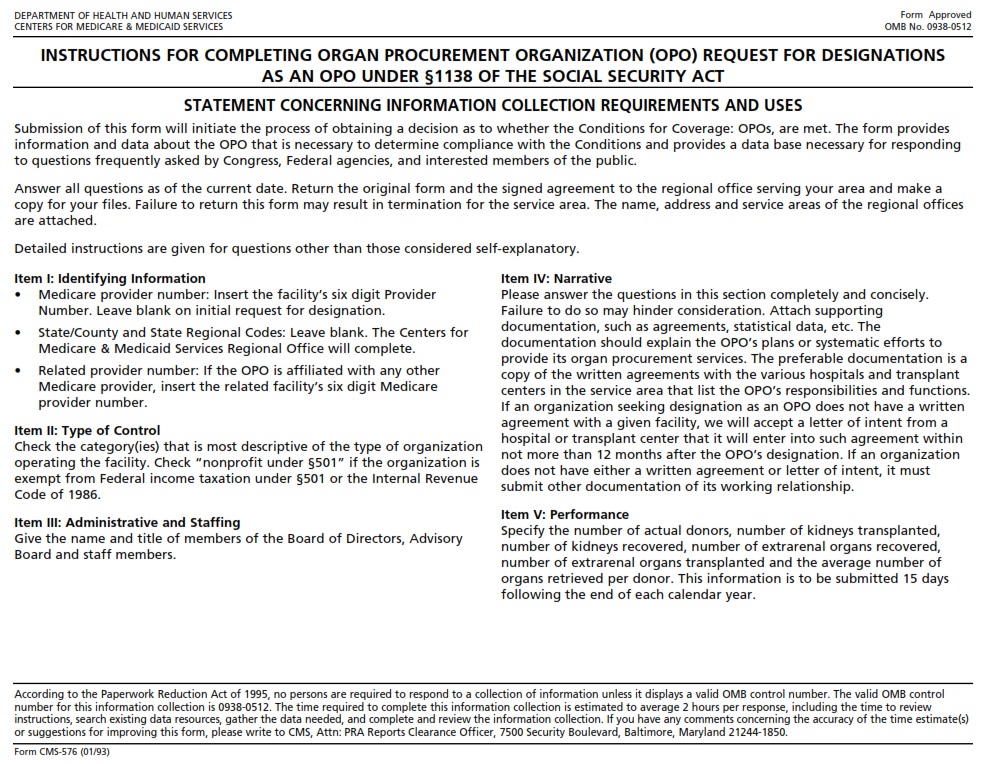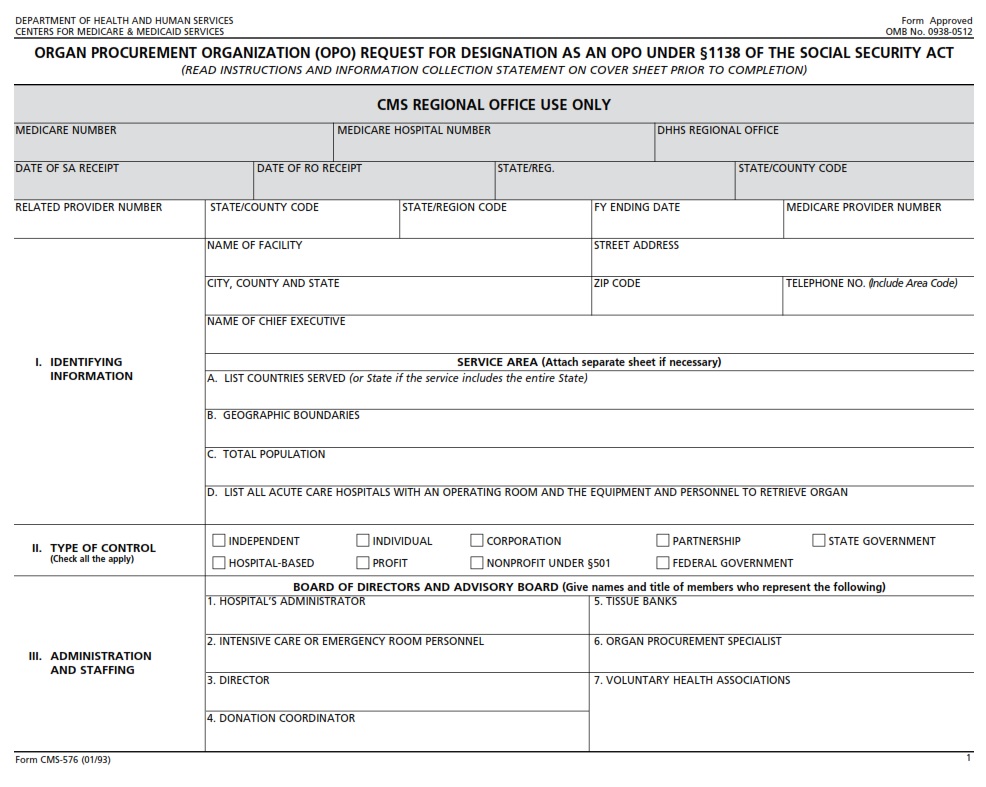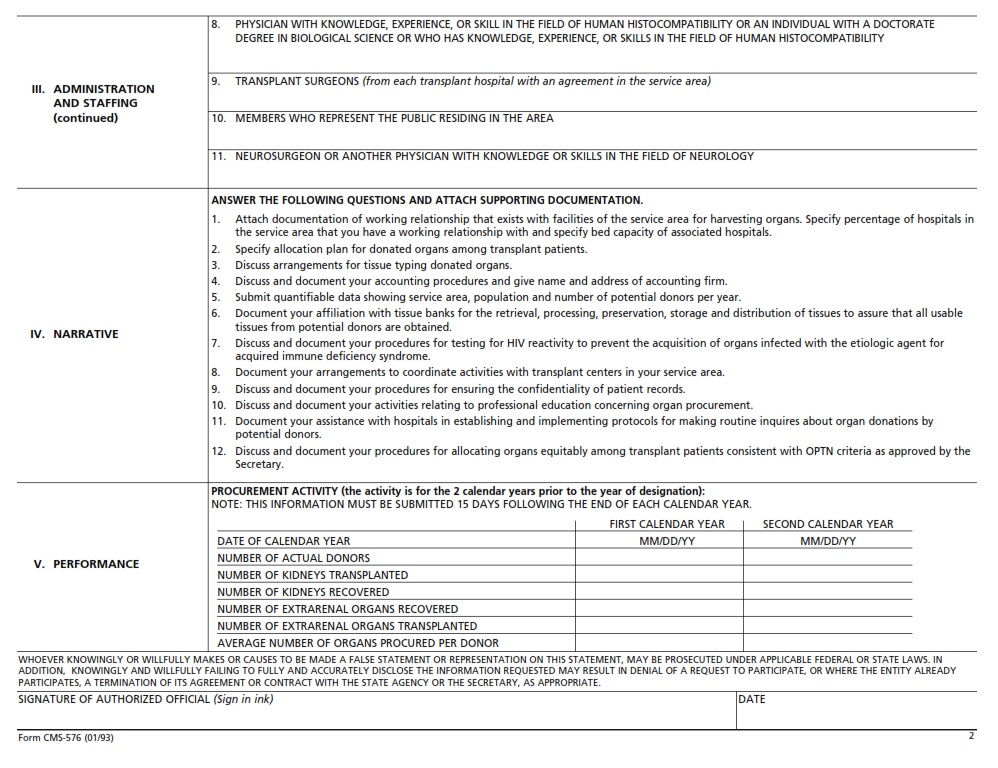CMSFORM.ORG – CMS 576 – Organ Procurement Request for Designation as an OPO – In the intricate world of organ procurement, an often overlooked yet crucial component lies in the designation of Organ Procurement Organizations (OPOs). CMS 576 serves as a pivotal document that outlines the requirements and procedures for entities seeking to be designated as OPOs, shaping the landscape of organ donation and transplantation in profound ways. As we delve into this complex realm where lives are interconnected by the selfless act of organ donation, we unravel a tapestry woven with hope, compassion, and ethical considerations. Join us on a journey through the corridors of healthcare advocacy and altruism as we explore how CMS 576 plays a vital role in ensuring equitable access to life-saving organs for those in need.
Download CMS 576 – Organ Procurement Request for Designation as an OPO
| Form Number | CMS 576 |
| Form Title | Organ Procurement Request for Designation as an OPO |
| Published | 1993-01-01 |
| O.M.B. | 0938-0512 |
| File Size | 248 KB |
CMS 576 - Organ Procurement Request for Designation as an OPO (2605 downloads )
What is a CMS 576?
A CMS 576, also known as the Organ Procurement Request for Designation as an OPO, plays a crucial role in the organ donation process. This form is utilized by organizations seeking designation as an Organ Procurement Organization (OPO) to manage and coordinate the recovery of organs from deceased individuals for transplantation. It serves as a formal request to the Centers for Medicare and Medicaid Services (CMS) for official recognition and authority as an OPO.
The CMS 576 is designed to ensure that designated OPOs meet specific criteria related to performance metrics, geographical coverage, donor potential identification, and other important aspects of organ procurement. By completing this form accurately and effectively, organizations can demonstrate their capability to fulfill the vital role of facilitating organ donations while adhering to regulatory requirements. The thorough evaluation process involved in obtaining CMS approval through the 576 form underscores the importance of transparency, accountability, and competency within the field of organ procurement.
Where Can I Find a CMS 576?
When it comes to locating a CMS 576, individuals often wonder where they can access this essential form for Organ Procurement Request for Designation as an OPO. The Centers for Medicare & Medicaid Services (CMS) website is a primary source to obtain the CMS 576 form. Furthermore, healthcare organizations and hospitals may also have access to these forms through their internal systems or designated personnel. To ensure efficiency in the organ procurement process, it is crucial for OPOs and relevant entities to have easy access to the CMS 576 form.
One innovative approach that some organizations have adopted is digitizing the CMS 576 form, making it more accessible and user-friendly. By utilizing online platforms or specialized software, stakeholders involved in organ procurement can streamline the process of submitting and processing these important documents. Additionally, collaborating with technology providers specializing in healthcare solutions can offer novel avenues for securing the necessary forms like the CMS 576 efficiently. In a rapidly evolving landscape of healthcare technologies, leveraging digital tools can significantly enhance the effectiveness and speed of organ procurement operations.
CMS 576 – Organ Procurement Request for Designation as an OPO
Organ procurement organizations (OPOs) play a crucial role in facilitating the donation and transplantation of organs to those in need. The designation process for becoming an OPO is a meticulous one, requiring organizations to meet specific criteria set by the Centers for Medicare & Medicaid Services (CMS). CMS 576 outlines the requirements that must be fulfilled by entities seeking designation as an OPO, including demonstrating the ability to effectively recover organs and work collaboratively with hospitals and transplant centers.
Successfully obtaining the designation as an OPO signifies a commitment to upholding high standards of organ procurement and transplantation practices. It also opens up opportunities for OPOs to collaborate with various stakeholders in the healthcare industry, ultimately increasing access to life-saving transplants for patients on waiting lists. While the process may be rigorous, it serves as a testament to the dedication and expertise required in ensuring successful organ donation outcomes.


